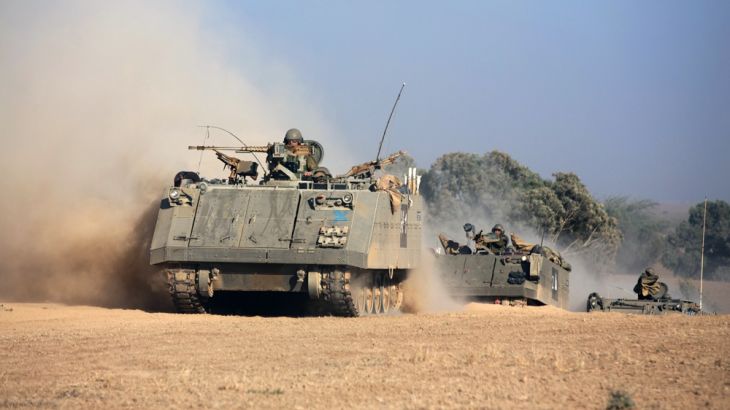Israel’s cabinet ‘ignored warnings’ over 2014 Gaza war
State inquiry says cabinet never discussed possible alternatives to army action, which killed over 2,250 Palestinians.

A two-year inquiry into the 2014 Gaza war by Israel’s official watchdog has found that the government failed to explore diplomatic solutions to prevent the seven-week conflict.
Released on Tuesday, the report by State Comptroller Joseph Shapira also criticised Prime Minister Benjamin Netanyahu’s cabinet for ignoring earlier warnings by Israeli security services that the deteriorating humanitarian situation in Gaza would lead to grave consequences for Israel.
The 200-page report goes on to assert that the security cabinet never discussed possible alternatives to military action, such as taking steps to ease the dire humanitarian crisis in the blockaded Gaza Strip.
“The report says the … government was warned for months before the summer of 2014 by the security services of the difficult humanitarian situation in Gaza,” Al Jazeera’s Bernard Smith, reporting from Gaza, said.
“The security services said there would be great consequences for Israel if that humanitarian situation was ignored. But the comptroller said the cabinet never discussed these warnings,” he added.
“The humanitarian situation the security services warned about in 2014 is just as bad now, if not worse.”
More than 2,250 Palestinians, including nearly 1,500 civilians, were killed and a further 11,000 were wounded in the July-August 2014 conflict, according to Palestinian and UN estimates.
At least 18,000 Palestinian homes were completely destroyed, and 73 medical facilities were severely damaged.
Most of the destruction resulted from more than 6,000 Israeli air strikes in less than two months on heavily populated areas.
On the Israeli side, 66 soldiers and six civilians died.
![At least 2,250 Palestinians were killed when Gaza war erupted in the summer of 2014 [File: Menahem Kahana/AFP]](/wp-content/uploads/2017/02/ffaf1627149541b89b6d6180c934348b_18.jpeg)
The comptroller’s report found numerous flaws in Israel’s operation, including the failure on the part of Netanyahu as well as his defence and intelligence chiefs to make the security council aware in a timely fashion of the “strategic threat” of a network of tunnels dug by Hamas from inside the Gaza Strip.
The tunnels were the main target of the 2014 ground invasion, but Israel’s comptroller pointed to a previous report that said the military had no tactics, nor appropriately trained personnel to deal specifically with the issue.
“The suggestion is that the military went in very heavy-handedly to deal with these tunnels at the consequence of thousands of Palestinian homes destroyed, and many of them still today are waiting for their homes to be rebuilt,” said Smith.
Gaza is one of the most densely populated areas in the world, and Palestinian civilians get no say in where Hamas fighters decide to operate from, added Smith.
“All of this destruction and losses because Israel says there were tunnels,” said Gaza resident Jamal al-Helo. “Three years after the war we’re still suffering. It’s the civilians that paid the heaviest price from Israel’s war.”
In response to the report’s findings, Netanyahu said on Facebook that “the tunnel threat was presented in detail to the security cabinet in 13 separate sessions and was discussed in all its severity while examining all of the strategic and operational scenarios”.
ICC probe
In Gaza, Fawzi Barhoum, Hamas spokesman, accused Israel of committing “war crimes” in the fighting.
“This government is a government of terrorism using all kinds of killing against Palestinian civilians,” he said.
“All those who committed crimes against the Palestinian people and against the civilians in the Gaza Strip must be prosecuted at the International Criminal Court.”
The ICC has opened a preliminary investigation into Israel’s actions during the war, but Tuesday’s report could help Israel fend off the probe.
Before opening a full-fledged war crimes investigation, one of the ICC’s criteria is whether a country is capable of investigating itself and prosecuting its own citizens.
|
|